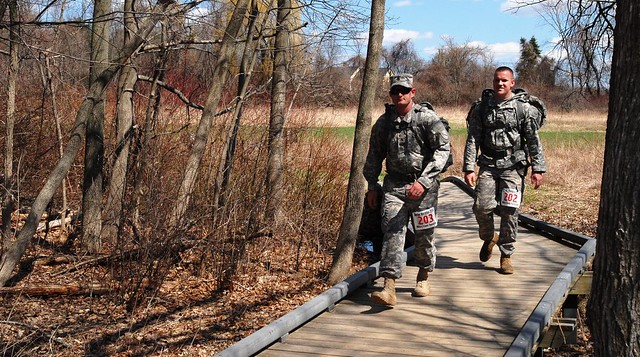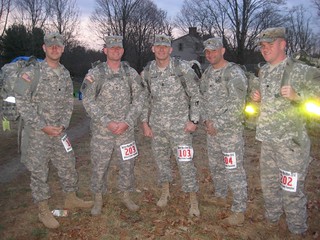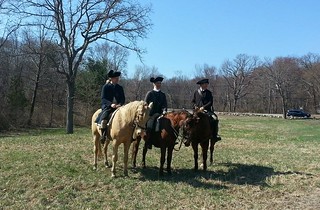By Staff Sgt. Jerry Saslav, Massachusetts National Guard, with contributions by Kentucky National Guard Public Affairs
[caption id="" align="aligncenter" width="576"]

Wearing a race bib with the number 203 on it, Staff Sgt. Jarred Turner, truck driver, 2123rd Transportation Company, Kentucky Army National Guard, walks along the historic Minute Man National Park during a 26.2-mile ruck march to honor fallen service members and raise money to assist their surviving family members, April 19, 2014. (Photo by Staff Sgt. Jerry Saslav)
April 21, 2014 — CONCORD, Mass. - Over 300 heads bowed in remembrance as Steve Fiola said, "The primary reason we are here is to pay tribute and to honor our fallen."
Fiola, a core member of Tough Ruck, stood in front of a large group of service members, veterans, Gold Star Families and other supporters. "So I'm going to ask that we take a moment in silence to honor our fallen brothers and sisters."
[caption id="" align="alignright" width="320"]

Members of the Kentucky National Guard's 2123rd Transportation Company participated in the historic Tough Ruck march, coming in at 7hrs, 34 min. Pictured left to right are: Spc. Shawn Miller, Staff Sgt. Jarred Turner, 1st Lt. Carson Gregory, Sgt. Kyle Carroll and Spc. Michael Orr. (Photo courtesy 1st Lt. Carson Gregory, 2123rd Transportation Company)
A diverse group of men and women gathered on a small hill overlooking the North Bridge, where 239 years earlier men of the Massachusetts Militia had turned back the British Army on the opening day of the American Revolution. The people who gathered on April 19, 2014, were Soldiers, Airmen and a U.S. Marine representing the active duty, National Guard and Reserve components as well as military cadets, veterans and citizens.
They had come together from many parts of the country to take part in a charity event, the Tough Ruck to raise money for the Military Friends Foundation, a private organization that assists military families in need. As the historical reenactors kept alive the memory of April 19, 1775, the people on the hill prepared to keep alive the memory of those no longer living in a very military way; they would march 26.2 miles wearing their military uniforms and carrying rucksacks weighing on average 30 to 40 pounds. Many rucksacks were adorned with large streamers bearing the name of a service member no longer living.
Marching with a rucksack is known as rucking and this year's event almost did not happen.
Click here for more photos of this event.
[caption id="" align="alignleft" width="320"]

The ruck march was conducted under the watchful eye of the local militia. The event honors an incident 239 years ago when the Massachusetts Militia turned back the British Army on the opening day of the American Revolution. (Photo courtesy 1st Lt. Carson Gregory, 2123rd Transportation Company)
For many years many of these same individuals had marched along the route of the Boston Marathon, passed by the runners and cheered on by the crowd. The attack on the 2013 Boston Marathon changed that tradition.
Due to security concerns, backpacks and rucksacks were banned from the course. Fiola, one of the core members of Tough Ruck, a private organization, reached out to the National Park Service and the Trustees of Reservations and received permission to start and end the ruck at the historic Old Manse museum and conduct the majority of the march on the trails of the Minute Man National Historic Park.
The 297 ruckers left as a group just after 7 a.m. and began what for many would be a six hour and 26.2 mile journey on the road.
"Marching this event was so worth the trip," said Spc. Michael Orr, 2123rd Transportation Co. "It was very gratifying for us and everyone around us. It was great seeing everyone in Lexington, Concord and Boston so patriotic. So many were out cheering us on."
""We finished together, that was our goal when we left Kentucky," said Orr. " This was my first ruck march since basic training, so our training really helped us and kept us together."
Col. Andrew Lawlor, staff judge advocate, Joint Force Headquarters, Massachusetts National Guard, and his son Jackson stayed together. Jackson is a cadet in the Reserve Officers Training Corps at the University of Notre Dame.
"Toby Keith said "I'm not as good as I once was, but I'm as good once as I ever was," said Lawlor, as he and his son headed to the finish line.
[caption id="" align="alignright" width="320"]

CONCORD, Mass. – National Guardsmen from the 2123rd Transportation Company, Kentucky Army National Guard, cross the finish line after walking the historic Minute Man National Park during a 26.2 mile ruck march to honor fallen service members and raise money to assist their surviving family members, April 19, 2014. Many of the participants attached to their rucksacks the names of the fallen service members they are marching to remember. On average, each ruck sack weighs 30 to 40 pounds. (U.S. Army National Guard photo by Staff Sgt. Jerry Saslav, Massachusetts National Guard Public Affairs/Released)
That was a sentiment shared by many of the ruckers.
"The feet are a little painful; but all the support from the community, especially the Gold Star Families really made it special," said Staff Sgt. Jarred Turner, truck driver, 2123rd Transportation Company, Kentucky Army National Guard, "they kept us motivated."
Turner was part of a group of five Kentucky Army National Guardsmen who drove up together to ruck the course; they stayed together throughout the route.
As the ruckers crossed the finish line, they were met by Gold Star Mothers and other volunteers who placed Boston Marathon medals over their heads. The medals were donated by the Boston Athletic Association.
As they removed the rucks that they had carried for so many hours, many of the service members were already looking forward to next year.
"I like this route better, with all the history that's on this route ... it's very humbling," said Spc. Adam Ayer, fire support specialist, Headquarters and Headquarters Battery, 1st Battalion, 101st Field Artillery Regiment. "You're passing by grave markers where Soldiers have been buried ... it kind of puts everything into perspective. The Boston Marathon ... we've been doing it for years, but it's really not our place. When you see the old houses ... the grave markers .... the reenactors. You realize how much blood was shed on these grounds. The militia fought on this ground."
"You feel more at home on grounds like this," said Ayer. "Soldiers belong on this trail."